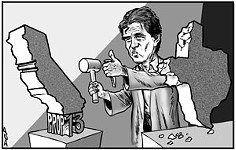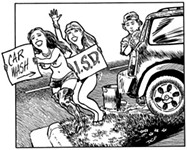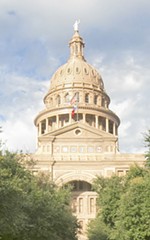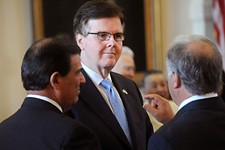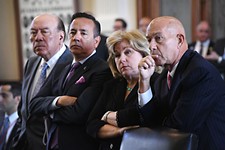On the Lege
A House of Cards
Edited By Michael King, Fri., May 7, 2004
The governor's counterparts over at the Legislature were apparently wearing different spectacles. Lt. Gov. David Dewhurst complained loudly that Perry should have "let the legislative process work" before raising his scythe, and Speaker Tom Craddick did likewise. On Tuesday, as the full House was finally allowed to shudder into motion, Craddick and several of his fellow Republicans dragged the governor's Educational Excellence and Property Tax Reduction plan before the whole House just to dismissively shoot it down, 126-0 (16 present not voting). When Rep. Mike Krusee, R-Round Rock (who has spent the last two weeks gamely carrying the governor's water bucket), praised Perry's "unprecedented" personal appearance before the committee (neglecting to mention that Perry was there only because he couldn't recruit a sponsor), Angleton Republican Dennis Bonnen asked Krusee pointedly if he could remember any governor derailing a major bill via press conference before the House even had a chance to discuss it. Krusee said no.
Craddick had already prefigured this little tap-dance on the governor's pride in a hastily called press conference just before convening. But the demise of Perry's "EEPers!" plan was the least of Craddick's worries – the payroll tax was now DOA, and noisily widespread opposition (mainly Republican) to the gambling provisions (video lottery terminals, otherwise popularly known as "slots for tots") had also killed any possibility of the constitutional amendment those would require. (From the looks of the Capitol lobby, chockablock with gaming proponents bearing tiny cell phones and large wallets, never have so few spent so much in return for so little.)
A few hours later, it all came crashing down. The leadership grimly pulled the payroll tax and the VLTs, raised the promised property tax cap from $1 to $1.20, and thereby diminished the so-called "new money" for schools to a relatively trivial $600 million – not enough even to keep pace with population growth, nor even to fund the governor's proposed "performance incentives" (those too had already been all but nominally jettisoned). There was no longer even the pretence of a "2% minimum" in one-time additional money, only grafted onto the original bill by means of a grab-bag "hold-harmless" provision covering fully 75% of school districts. It was this stripped-down version that Arlington's Kent Grusendorf, chair of the Select Committee, desperately attempted to sell the House Tuesday afternoon, over loud objections from Democrats that he was essentially ceding all control of the revenue side of any subsequent bill to the Senate.
If that weren't enough, the Legislative Budget Board had earlier issued a fiscal note analyzing the tax plan in the original bill – payroll tax, expanded sales taxes, cigarette taxes, slot machines, bottled water tax, property tax cuts, and all – and reported that only the top 3% of taxpayers in the state (earning $180,000 or more) would actually pay less in overall taxes under the bill. The rest of us would end up financially worse off, and the folks at the bottom would take the biggest hit. The sales-tax-only version was little better – a hard sell, especially to a House already restive with rebellion, completely in the dark about the details, and increasingly suspicious that most of their (bipartisan) school districts would very likely be worse off under this train-wreck of a "school finance" process.
"If we don't have a bill that will adequately fund our children's education," thundered Speaker Pro Tem Sylvester Turner from the back mic, "why don't we recommit the bill to committee and take the time to get it right?"
"Because we're trying to move the process along," replied Grusendorf, looking even more constipated than usual.
Facing a couple of hundred substantive amendments and strong opposition, the leadership tried to force the issue and pass its "shell bill" to the Senate (planning for a stacked conference committee) with a series of parliamentary votes to close debate. They won that fight, but it was only Pyrrhic – the bill itself went down, ignominiously and to loud cheers, 77-69, meaning that when push came to shove, nearly 20 Republicans had bolted. Democracy had broken out in the Texas House.
It didn't last – after two hours of private meetings off the floor, the House returned to "reconsider" its vote: 77-66 to revive the bill. More push had clearly come to much more shove – the final vote on passage was 73-70 in favor.
It's their bill now, if they can keep it.
Got something to say on the subject? Send a letter to the editor.





